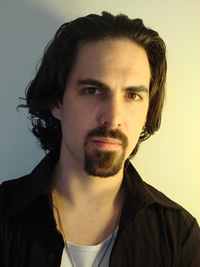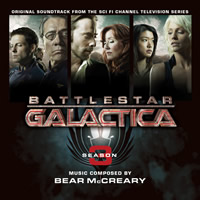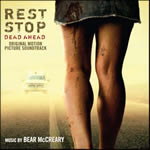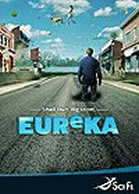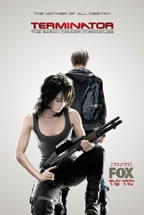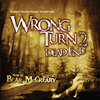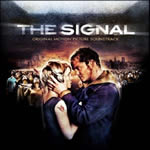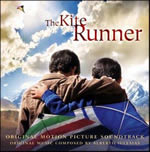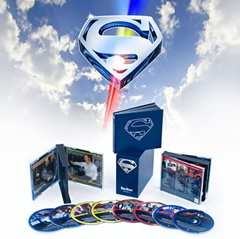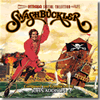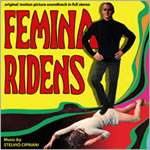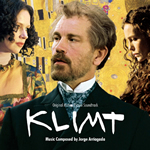 |
From Battlestar to Skynet: The Film Music of Bear McCreary
February 27th, 2008
By Randall D. Larson
This week we feature a career spanning interview with Bear McCreary, discussing at length his seminal work on the revived Battlestar Galactica as well as his current music for Terminator: The Sarah Connor Chronicles. We also look at his experiences scoring the unique fantasy series Eureka as well as the horror films Rest Stop and Wrong Turn 2. This week’s reviews focus on Mark Isham’s Point Break, Murray Gold’s Doctor Who: Series 3, Francesco de Masi’s Thunder and Thunder 3, newcomer Ben Lovett’s score to The Signal, and Alberto Iglesias’ poignant score to The Kite Runner. Plus the roundup of notable film music news from around the globe..
Bear McCreary An Interview with Bear McCreary
Composer Bear McCreary seemingly came out of nowhere to invest the 2004 reincarnation of Battlestar Galactica with a rich and imaginative scoring palette. His music for the cable TV series quickly garnered him additional, high-profile assignments such as feature film scores to Rest Stop and Wrong Turn 2. He has continued to score all seasons of BG, as well as television’s small town fantasy series, Eureka and, most recently, the new Fox series Terminator: The Sarah Conner Chronicles. In this interview, we talk at length with Bear McCreary about that series as well as his background and his approach to the other significant entries on his filmography.
Q: You apprenticed with Elmer Bernstein. How did you get involved in that, and how did that prepare you for where you are today?
Bear McCreary: It's sort of a roundabout story. I met Elmer when I was in high school. I ran into a guy who was involved in a yacht club, and Elmer keeps his yacht in the little town I grew up in. So I was at this event when I was in high school, and they were talking about how I wanted to go into film music and how I was considering going to USC. And this guy comes up to me and says, “Well, if you're interested in film music, you should come meet my friend.” Okay, cool, whoever. “Have you heard of Elmer Bernstein?” And of course, my jaw hits the floor! I couldn't believe what he was saying. So I ended up meeting Elmer, and he wrote me a letter of recommendation to get into USC, and I worked with him for about seven or eight years.
Q: What drew you to film music in the first place?
Bear McCreary: Hard to say. I've always loved film music, but it's probably because I've always loved music and I've always loved movies, so sort of the obvious mix of the two. Ever since I was a kid I was always paying attention—very close attention—to the music in movies. Whenever I'd go to movies with my friends all I'd be talking about afterward was “Did you hear that French horn line that Jerry Goldsmith used in that one scene?” All my friends—well, they don't know what I'm talking about!
Q: What training did you have?
Bear McCreary: I was involved in the music program at USC for five years. My formal training came from doing a lot of student films there at SC; I did about thirty or forty. That really prepared me for the ego bruising that you get in the collaborative process, which is not something they can really prepare you for in class. I had gone through that process so many times! I also had some experiences where I was able to go watch guys like Elmer and Danny Elfman and some of these other really established composers doing sessions, and as I watched them in action, with these established filmmakers, I realized that the exact same issues I was dealing with on a 12-minute student film come up again in the real world, in the professional world. It was an eye-opening experience to how applicable the student film experience really is.
Q: You did some small films before Galactica. What were some of those experiences like?
Bear McCreary: Some of them were pretty remarkable. One of those student films was a musical [When The Kids Are Away, 2002] that I wrote the songs and the score, and we did it with a sixty-piece orchestra and twenty-voice choir on a budget of basically nothing. It was basically me assembling all my friends in college, anyone who played an instrument, I invited down and paid for food. It really started a real love of mine for working with as many live musicians as I can, and really working with whoever I can get. Many of the decisions we make on Galactica are creative but in the very beginning some of them were budgetary, and it was a matter of who can I get that plays anything. That was one of the defining moments that set the tone for that score.
Q: So how did you make the jump from student films to Galactica?
Bear McCreary: I worked with Richard Gibbs for about a year on several projects. One of the things that came through the pipeline when I was there was the Battlestar Galactica miniseries, so I ended up writing a bunch of the music on that. With the incredible deadline that we had on that, I ended up writing a ton of the percussion cues while Richard had to go and develop the thematic material. A whole bunch of action cues just had to get written. I ended up working pretty closely with Michael Rymer and some of the other producers, but especially Michael, and I learned what he wanted in terms of the percussion writing, because he kept saying he wants taiko, he wants taiko. The climactic battle scene at the end of the miniseries is this nine-minute action sequence that I wrote brand new, from scratch, four times! So by the time I was done doing that, not only had I gotten to know Michael and everybody pretty well, but I really got a feel for what they wanted in terms of the percussion writing. The show got picked up, and Michael did a couple of episodes but he went back to features, and I was the obvious choice to come in.
Q: The music for Galactica is not what you'd expect from sci-fi. How did that come about?
Bear McCreary: It's been a natural progression, but in the very beginning all that Michael Rymer and the other producers knew was that they wanted was the opposite of Star Trek. They didn't really know anything more beyond that, which was fine, but they knew they didn't want an orchestral sound. Michael had attempted the miniseries with some Peter Gabriel and some traditional taiko pieces, so that sound had kind of been established. So when I started the series, I had an extremely limited palette – a lot of percussion, but mostly taiko drums and frame drums. I only had a handful of instruments that could play anything melodic. I had the duduk and an instrument called the bansuri, but literally nothing else could play a melody or else the producers would get angry – they would call that a theme and they didn’t want themes. Well, not exactly – what they didn't want was Luke Skywalker staring at the sunset while the French horns played his theme. As the show went on I started developing themes – I never called them that, but I started creating motific ideas that started coming into the texture that represented certain characters. There was an iris sound that snuck in during the end of the first season that represented Commander Adama and his son, for example. Towards the end of the first season one of the producers turned to me during one of the playbacks and said, “Can we get some of that Boomer theme right there? I want to hear the Boomer theme.” And I thought to myself: we'd never had a discussion that said it was okay for me to start writing a Boomer Theme, but I happened to have done it, and they noticed it, and from that point on I started exploring other possibilities once I realized that this show could develop. But obviously the writing and the performance of the show developed a lot. I'm always just trying to keep up with what the writers are doing.
Q: How did budget affect this?
Bear McCreary: It impeded it, obviously, because they couldn't afford an orchestral score. That's the obvious problem. But they didn't want an orchestral score, which is good, because nothing irks me more than hearing sampled orchestral instruments. This sort of opened up the floodgates for anything non-orchestral that I could find, and LA is a great town to find musicians who play unusual instruments. So it ultimately benefited the show because I started writing for non-traditional instruments and I still had to find ways for those instruments to speak musically the same way that an orchestral score would; meaning that the drama still had to be there, I just couldn't use twenty-four horns and sixty strings – I had a couple of frame drums and a duduk. The irony is that by the end of the first season they were asking for some orchestra, putting some orchestral strings back into the mix, but it was in a very different context. The strings, when they come up, suddenly sound special and unique, and when those episodes come up, I think users are subconsciously drawn to them because it sounds bigger, whereas if we plastered every episode with strings that effect would be lost
Q: Now that you're working on the fourth season, how has the development process changed?
Bear McCreary: That's hard to say, because I can never tell as it's happening. I look at the soundtrack CDs I've put out of the first three seasons – the third sounds the best but they each sound very different to me. I never noticed that as I was writing it. It's only when I'm done and I look back and I realize, wow, the sound has really changed! In the fourth season, there's a lot more of the prophecy and religious subplot that you started getting hints of in an episode called “Maelstrom” and in the season finale, especially, so you’re hearing a lot more of the certain Middle Eastern instruments that have come to represent that subplot. But there's a lot of really big, kick-ass action cues. It’s certainly the most ambitious set of scores we've done yet. The number of tracks that we're dealing with on an episode-by-episode basis has become almost comedic!
Q: How has this score been affected by the increasing popularity and acceptance of non-traditional music in film scores?
Bear McCreary: That wasn't something that I was thinking about in the big picture, in terms of what audiences are ready for and what's come in the past. I just looked at the show as a stand-alone, and what it needed was something that helped, in a very subtle way, to accentuate the undertones. Everything is understated in the show and in the beginning I found it was very difficult to find music that wouldn't push the drama too hard. The ethnic instruments also had a narrative impact for me as well, because the story's about these people trying to find Earth, and we don't know if Earth even exists, or when they get there it'll be today or it'll be a million years ago. What I wanted to do was tie in Earth's history with their history. They keep talking about their gods, that are the Greek and Roman gods, and there are these very subtle connections between their universe and ours. I thought it would be a neat way to communicate to the audience on a subconscious level that they are connected to us, this story is relevant to our own story. That seemed to work. I feel less like I'm just scoring the action and telling you what's happening in a given scene, and more like I'm trying to connect the bigger picture to the overall story.
Q: You wrote the songs and score to Rest Stop. What were the challenges there?
Bear McCreary: That score was a blast. I signed on to the movie and I pitched the director, John Shiban, doing it kind of like if Ennio Morricone had done a horror score in the ‘70s, what it might have sounded like. The villain is this anonymous driver, called The Driver, who drives this yellow pickup truck and he has these supernatural powers, and we came to represent him with a banjo, and it was a very distorted, evil-sounding banjo. And it was woven into the score – quite literally, every time this guy's on screen, you're hearing the banjo play his theme. I didn't even realize I was being totally literal with it. And then also, the score's really melodic. That was the other thing I wanted to do, was not was create an ambient orchestral cluster Ligeti-inspired horror score. Horror scores to me are just so uninteresting, in general, right now. There are some really good ones, but there's this feeling that they're interchangeable. So I found a way to electrify the banjo and the fiddle and the accordion and get this really gnarly, distorted sound. And later that summer I did Wrong Turn 2. I looked at this story and realized it's about mutant hillbilly cannibals, and so I pitched it and said, well what if we did mutant bluegrass music? They thought it was a cool idea, so out came the banjos and the fiddles and the accordion again and we did a second horror film, which actually ended up with a very different sound. And this month we're going in and doing Rest Stop 2, which is the third in my trilogy of horror scores with banjo and accordion and fiddle!
Q: How do you use what are traditionally rather friendly-sounding instruments to still keep the score scary?
Bear McCreary: The alien quality of the sounds, in that context, kind of do it by themselves. The sounds I think are very hard to identify – especially the banjo sound, which, as Rest Stop went on, we started putting in a few unaltered, acoustic banjo fragments, just to kind of psychologically grasp that it was a banjo. Otherwise you might not even get what the sound is. To me, creating a landscape that you haven’t heard before is what gives audiences that sense of unease. That's ultimately why Ligeti-inspired atonal writing has been so good for horror movies because most people don't spend their day listening to music like that. But, after a while, we have seen enough horror movies that we've really come to kind of expect it. And it’s also a matter of the fact that there are many places where you sort of have to hit them with a big loud sting. But the more of those you do the less effective they are, so spotting a horror film is probably the most important step. If you can figure out in the beginning where the really big scares are and where you can let sound design take some of the job off your plate. It is really important.
Q: You scored the second season of television’s Eureka. What was your approach to this, coming in on something that already has an established musical signature?
Bear McCreary: I stepped in and kind of politely threw it all out. Otherwise I wouldn't have stepped in, if they had just wanted me to go through the motions. Outside of the theme song, I wrote new themes for every character and really tried to give it a more thematic approach and come up with not only themes for each character but kind of a sound for the show. I think that's what they really wanted, a defining sound. Eureka was a lot of fun. I get to do everything that I don't get to do in Battlestar and horror movies. It's a lot of bluegrass and blues sort of filtered through ’80s new wave. There's a lot of cajun zydeko sounds in there and a lot of goofball synthesizers that I would never get to use otherwise. But it's really fun, and we're gonna have an album out of that in the summer, which I'm really looking forward to, because it really showcases another side to my musical personality.
Q: Like your banjo & accordion horror scores – it’s twisting of something natural, to fit the oddness of show.
Bear McCreary: Absolutely. That show is one that could have a more typical score, but their whole idea is to present this town that on the outside looks kind of normal. With a passing glance you might think everything is normal but right under the surface every single person in this town is either a mad scientist or an evil genius. That has afforded so many opportunities for really fun music. Again, to me what's more interesting than all the crazy sci-fi parts of the story is the intimacy of the characters, playing up that it's a small town even though I'm using all these strange instruments. Ultimately that’s the reason that I'm drawing from these folk sources – I want it to feel like really weird, small town music.
Q: Musically crafting an environment for the show.
Bear McCreary: For the audience there's an extra layer of disbelief that has to be suspended. Honestly the ultimate challenge in Eureka is not only does it have that sci-fi quality but you're still trying to be funny, and you still have to play all these little comedic beats. When you're scoring a comedy scene there's at least as many things you have do in the scene to help make it funny
Q: You also scored the Galactica DVD feature, Razor, which came between Seasons 3 and 4. What was that like?
Bear McCreary: I had a couple of weird experiences this fall and that was one of them. Musically I drew upon the lessons I learned in Season 3 and, musically I think it's a really good score, but logically it fits in Season 2. The film itself has that same weird feeling of moving forward but at the same time, it's like a chapter from the past. So I also got to plant all these little musical seeds of things I know were coming in Season 4 and Season 3, especially with Starbuck’s character, doing little winks to what happens to her in Season 3, and it was cool to be in on that. The other weird experience I had was, we did an extended version of “Unfinished Business,” the boxing episode for the Season 3 DVD set, which is coming out in March. So I actually had to go back and rescore a good chunk of that show, which I might add was one of the most challenging experiences I had in Season 3 – that episode was just massive. Going back to it was like having to go through surgery a second time! It was incredible, but it was neat because I got to go back and sort of Season 4 sensibilities to this older episode that I'd already gone through. I got some really good cues out of it.
Q: What was your approach to Terminator: The Sarah Connor Chronicles?
Bear McCreary: It was interesting. During my first meeting with the producer I wasn't quite sure what to make of the whole situation. They called me in, they didn't ask me to demo, they didn't even ask for a CD. I think somebody had my Galactica CD already. We talked for maybe a half-hour or 45 five minutes and then I got the gig. And all we really talked about was Terminator! I told them what a fan I was of the series. When they asked me what I would do, I told them that I wanted to acknowledge the first two films and really make this show feel like it's connected to Terminator 2. Obviously that's what they're trying to do with the series itself. The music is a big part of that, I feel. The show doesn't necessarily look like Terminator 2 – you have two new actors, you’re not going to have incredible special effects every episode, so the music is probably the most important thing you can do to tie it in with that franchise. The other thing that’s interesting is that, on Battlestar, my job is musically to musically ignore the source material as much as possible, meaning the old ‘70s show, I'm supposed to do anything that sounds different than that. With Terminator it's quite the opposite approach, I'm trying to pay homage to the original scores. It's been great because those scores are such cutting-edge synthesizer work for their eras – the first one and the second one I think are some of the most admirable synth scores ever done, if not the best synth scores ever done. I mean, Terminator 2 doesn't even sound like a synth score it's so good. So it’s been great to tackle that sound with the technology that exists today. It's a much different animal now, to be able to do those kinds of sounds. In many ways I've had so many sounds at my disposal I'm still figuring out what works.
Q: Something that struck me about the score while watching the show is that you’re not only creating and continuing this very percussive, very relentless mechanistic/industrial kind of sound for the terminators, but you’re really contrasting the human element of the story with some really nice melodic writing for the human characters which really emphasizes the drama of their predicament, which is an area the Brad Fiedel scores for the first two films didn’t venture into.
Bear McCreary: That was the one place where I wanted to really deviate from the tone of the first two films, because the emotional side of those films was very cold and very distant, and it worked very well, but that's not gonna fly for us. You have to connect with the characters more if you're going to invest hours or more of your life in watching a show. So that was something that there really wasn't anything to draw from and was something that I could invent from scratch. The electric string ensemble came in, and I'm really pleased with how well it turned out. The electric strings play together as a group and it ends up sounding like a very odd string orchestra, almost. But it also still has a very strange electronic quality because they're being run through electronic equipment, so it doesn't necessarily sound like an orchestra. To me it's really fitting for the Terminator mythology.
Q: What was your approach to the Summer Glau character?
Bear McCreary: That was a challenge, and you know, honestly I'm kind of avoiding writing too much music for her. Most of the time I'm playing people's reactions to her. As the season goes in, in episodes that haven't aired yet, you start getting some scenes that are really more about her, but if you think about it, her scenes are either about John wanting to believe in her and John wanting to follow her and take her suggestions and John wanting to become this leader, and Sarah's mistrust of her and reluctance to give up command of the troop, so to speak. So those relationships have always been the most interesting to score. It'll be really interesting as hopefully the show will go on and that's something that we can further exploreQ: What has been most challenging for you so far?
Bear McCreary: Oh boy! Schedules? Honestly, the schedule is the deciding factor, but really it’s just been a matter of figuring out what the tone is going to be, and once that's decided, it's really great to be able to work on a series where you go through a horrific experience in the first few episodes in what the tone is gonna be, what the instruments are gonna be. what's it gonna sound like, how hard do you hit the emotional things, how hard you hit the action scenes. And after that you can kind of explore and play, like in Battlestar now, writing the music comes so quickly. I have never written music as quickly as I do for Battlestar, just because I'm so familiar with it. With a movie, you go through that whole experience and right when you get through it, it's over. And you have to do it again.
Q: So what's next for you?
Bear McCreary: Well, I'm doing Rest Stop 2. I have to finish out Battlestar at some point. We don't know when that's going to be because of the writer's strike, and then presumably there's going to be more Eureka and Sarah Connor. But in the meantime I'm putting together a concert of Battlestar Galactica music which I'm gonna do here in LA in April, and I'll have details up on my site soon. We did that a couple years ago and it was such a success we're gonna do it again.
Q: You’ve done primarily a lot of work for science fiction and horror films, whether through choice or luck. Do you feel you’re becoming typecast, and is that an issue or not? What would you like to do that maybe you haven’t had the chance to yet?
Bear McCreary: Am I becoming typecast? Possibly – but I'll take it. I’d rather by typecast than not, at this point. But I don't know, it's still pretty early on in my career. I'm just happy to have so much work and I'm thrilled to be able to work on something as good as Battlestar. I'm just savoring these last few episodes because I know that when this show ends, it might be a really long time before I get to work on something, whether it's a film or a show, that's as dramatically satisfying as Battlestar is. I had a lot of side projects and classical music that I was writing that got put on the back burner when Galactica started, so in a way I'm kind of glad that Galactica is not going to be a ten year or fifteen year show. So at this point, I'm definitely happy where I am.
Thanks to Bear McCreary for taking the time to discuss his work in detail with me, and to Kelsey Larson for her expertise in transcribing the interview. For more information on Bear McCreary, see the composer’s web site at www.bearmccreary.comSoundtrack Recommendations
After only 17 years, Mark Isham’s first orchestral score makes it to CD, courtesy of La-La Land Records, whose release of Point Break, Kathryn Bigelow’s 1991 cult classic action film, brings Isham’s remarkable hybrid synth/symph score to new life in a limited release of 2,000 copies. I remember being quite affected by the score when I first saw the film, the music’s mixture of compelling atmospheres and emotive phrasings achieved a lasting resonance even after the film had ended. The music was tinged with orchestral melodies but sustained through pervasive, drifting ambiances of tonality and timbre; Isham’s music as much represented the sea and surf and sky that the film’s gang of philosophical surfer/robbers called home (most eloquently embodied by the 5-minute cue, “Skydive,” which awakens both protagonist and audience to the metaphysical connotations of the Patrick Swayze character’s philosophy to always live life on the edge; while emphasizing the conflicts within undercover FBI agent Keanu Reeves as his infiltration into the gang unexpectedly leads him to embrace Swayze’s philosophical sensibility). The music portrays the film’s underlying subtexts with an insistent grace while laying down a consistent tonal vibe that gives the film a unique sonic atmosphere. Initially intended as a synth-only effort, as had been Isham’s forte in the 15 scores that lay prior to this one; discussions with Bigelow revealed the need for a more epic sounding score and Isham found himself adding an orchestra to his pallet for the first time (all this is well described in Dan Goldwasser’s liner notes, which incorporate comments from both the director and composer as he describes in detail the genesis of the film and the score’s development from its pure synth origins to its final rendition as a masterful blend of orchestra and electronics). Isham uses the swells, fills, and melodies from the orchestra (sans woodwinds; a budgetary necessity) to emphasize the journey undertaken by Reeve’s character as he grows to understand and admire Swayze’s philosophy; while the underlying electronics tend to reign in these sensibilities with the darker facts of the gang’s subsistence – the bank robbery, fight, and chase scenes are scored almost entirely for percussion and electronics; while cues like “Skydiving” and “Night Surfing,” a powerful orchestral surging enhanced by a low, warbling electronic riff, emphasize the sweeping nature of the idealogy embraced by the characters. The contrast between the eloquent orchestral harmonics and the progressive chirping and sustained tonalities of the synths remains one of the hallmarks of this score, culminating in an amazing trilogy of final cues, “No Parachute,” “Love In The Desert,” and the 8.5-minute resolution, “Freedom,” in which Isham’s ideas play off of each other dramatically, as Swayze and Reeves face off as each realizes each other’s inherent situational incompatability.
England’s Silva Screen Records has released Murray Gold’s Doctor Who Series 3, the soundtrack from the third season of the BBC’s revived and reimagined timelord series. The music is richly orchestral and melodic/epic in nature, and extremely varied due to the series diversity of settings and time periods, while maintaining a consistent sensibility and thematic structure. Opening with Gold’s splendid 4-minute music from the Series 3 trailer, “All The Strange, Strange Creatures,” this music is instantly captivating. “Martha’s Theme” (from the “Smith and Jones” episode – fine expository notes from the composer on each cue identify episode titles and background of each track) is a very poignant theme for the Doctor’s new companion, very nicely sung by Melanie Pappenheim. The album contains 28 tracks from a dozen or so episodes, including two songs rerecorded for this album featuring the amazing voice of Yamit Mamo (one is the terrific swing dance number from “Daleks in Manhattan” and the other a modern pop song Gold wrote inspired by “Voyage of the Damned”). “The Carrionites Swarm” is rousing battle music, while “Gridlocked Cassinis’ is an amusing jazzy riff illustrating a pair of lady detectives marooned in an endless traffic jam. “Boe” is, not unlike “Martha’s Theme,” a poignant harmonic melody for lush strings and female voice (here evidently sampled). It’s a beautiful melody that crescends and resolves very powerfully, opening into a sustained rhythmic motif. “Evolution Of the Daleks” features the famous Crouch End Festival Chorus in a hearty, huge orchestral and chorale intonation – Gold’s “Duel Of The Fates.” A softer mood is presented with a chamber ensemble for the two-part “Human Nature/Family of Blood” episode (one track here restores a whistler than BBC exec’s voted out of the show when broadcast). This pair of episodes contained some of Gold’s most poignant and affective writing (especially the sublimely heartfelt “Dream of a Normal Death.” Martha’s Theme is reprised in a lavish, epic variation, becoming a wonderful, swashbuckling action cue in “The Doctor Forever” from “The Runaway Bride” (an extra episode prefacing Series 3, shown on Christmas day 2006; the climactic chase sequence from this episode featured an especially exciting orchestral accompaniment; while “After The Chase” proffers a bit of an eloquent respite). A suite from “Blink,” initially emphasizing a lonely bassoon, opens into a stirring action riff. From “Utopia”, a heavy metallic riff for “The Futurekind” provides an entirely new musical sensibility, while “The Master Vainglorious” contains some intriguing electronic warbling as it captures the quirky and malevolent essence of The Master before opening into a wonderfully harmonic, orchestral Star Wars-like crescendo. “This Is Gallifrey” is a cool Zimmerlike rhythm piece that builds a sumptuous but melancholic reverence for the destroyed home planet of the Time Lords. “Donna’s Theme,” introducing the Doctor’s new companion for Series 4, is a delightfully energetic, if almost cartoonlike, scherzo for winds and strings over piano and percussion. The cd is closed with a hushed chorale version of the hymn “Abide with Me,” used in the episode “Gridlock.” Murray Gold’s music for Doctor Who is among the best television music out there, consistently interesting and provocative; Silva’s compilation of Series 2 music, magnificently performed by the BBC National Orchestra of Wales under Ben Foster’s baton, is compelling, energertic, and very, very pleasing.
Armando Trovaioli has composed a cool R&B styled action score for Alberto De Martino’s Italian cop thriller, Una Magnum Special Per Tony Saitta (1976, aka Blazing Magnum), which has been released on CD for the first time by Italy’s Beat Records. Set in Montreal, the film starred Stuart Whitman as a police captain searches for the person who poisoned his sister; it’s De Martino’s first movie set and filmed outside of his homeland, and the film has gone on to become one of the most iconic of the genre. Trovaioli, one of the Elder Statesmen of Italian film music, is new to the cop genre but provides an energetic scores built from R&B/disco grooves (“Tony’s Magnum”), elegant melodic statements (“Black Pearl Necklace,” “Who Killed Louise,” “A Weird Phone Call”), and cool, jazz-based themes (“Theme for a Murderer,” A very Strange Party”). It’s a very Schifrinesque score (Magnum Force had come out three years earlier, and there is surely a stylish connection in both film and score – try and listen to “Tony’s Back” without imagining Dirty Harry or Bullitt... or Shaft), giving the film both a hard, streetwise edge and an eloquent musical persuasion, while enveloping the film in a contemporary, recognizably modern sound. Trovaoili captures the genre’s musical essence in this score beautifully (the aforementioned “Tony’s Back” is one of the highlights, proffering a cool mystique wrapped in a forward-moving rhythm that is quite compelling, opening up, Shaft-like, from R&B/disco into compelling orchestral measures). The 12-track soundtrack album may be concise (31.53 min) but it provides all the musical elements captured in the film, and makes for a very compelling listen on its own.
Beat Records has also reissued their 20-track soundtrack to Francesco De Masi’s Thunder 3 (1985, CD released in 1989), combining it with the music to the original Thunder (1983, aka Thunder Warrior) – Thunder II having been scored by Walter Rizatti). The story is kind of a First Blood/Rambo tale with Mark Gregory as a native American (instead of a Viet Nam vet) who returns home only to find that his ancestral cemetery is being destroyed by construction workers. Both scores are drawn from the same cloth, with perhaps the third film having a somewhat more developed musical design. The scores are, with a clear nod to the style of Goldsmith in Rambo, a mixture of poignant melodies (lots of horns and harmonics (the gifted Franco De Gemini) and lots of highly action-oriented material. Vestiges of De Masi’s Italian Western style even emerge in a few tracks (use of reverbed electric guitar, harmonica, windy panpipes or ocarina, certain rhythmic figures, etc). A stalwart theme for the main character invests Thunder with honor and heroism, while a wide variety of suspense, action, and adventure motifs carry the shows forward. “Arizona Mountain” opens the score with a gentle homespun harmonica melody, and “Thunder Vengeance” exemplifies the titular character’s powerful trumpet theme over a cadence of percussion (the massed tom toms suggesting Thunder’s Indian heritage). Both of these themes will recur with regularity; an especially poignant interpretation in the first film occurs in “Wanted Thunder;” a variation of this motif invests the second track with a tense dynamic through strident electric guitar soloing. “Thunder Gymckana” features a spritely electric guitar solo over rhythmic orchestra for one of Thunder’s fighting styles. One of the nicest cues on the album is “Indians and Fire” from Thunder 3, an especially expressive cue that resonates with feeling and melancholy for a tragedy that occurs to members of Thunder’s family. The cue is very interestingly arranged for orchestra over a low twangs of electric guitar and a synthetic rhythm that sounds not unlike the ubiquitous locusts heard in so many Italian Western films. The sound creates a neat organic sensibility to the scene, while melodically portraying the tragedy of the visualization. “The Store Destruction” is a rhythmic action cue that lays down a cool vibe of electric bass and keyboard amid chirps of winds over a rumble of Indian-style drumming. “Looking for Thunder” is a pleasant rhythm cue for strings over cello and mixed percussion and almost Morricone-like intersperses of harpsichord; the cue generates a neat cadence and progresses into a persuasive motif of insistency and import. The album includes liner notes in Italian and English by the composer’s son, Filippo de Masi.
www.beatrecords.it
Ben Lovett is a new composer to Hollywood, and The Signal is his first solo feature film score. He contributed to the music of 2004’s The Last Goodbye and is now working on Jeffrey Goodman’s hitman drama, The Last Lullaby. Lakeshore Records has issued a soundtrack CD to The Signal, a science fiction/horror films in which a mysterious transmission which invades every cell phone, radio and TV, turning people into killers. The film is told in three parts from three different perspectives, by three different directors, but Lovett’s approach is consistently moody and tonal (three cues are co-written with reality-TV composer Matthew Compton). There are lots of tenuous and sustained musical strains, a hybrid of synths and samples and a live chamber ensemble, crafting together an organic and consistently disturbing repetitive vibe that emphasizes the insidiousness of the toxic transmission to the innocuous residents of Terminus, the strange city in which the film takes place. “Transmissions” provides a compelling keyboard riff layered over a bed of synths; “Crash” is also a very somber track devoid of cadence or progression until intricate and closely-mike guitar picking builds up to a rhythm track over drum kit and additional guitars. “Escape from Terminous” houses a blaring and fuzzy electronic pulse over atonal pushes of piano and percussion, a gargantuan heartbeat of malevolent industriana. “Signal Waltz,” presented in two movements, is an intriguing and attractive rhythm cue, in which Lovett develops his vibe into a growing claustrophobia of cadence and chord progression; the 2nd Movement becomes more melodic than the first, presenting a semi-classical sounding chamber piece that contrasts well with the score’s darker tonal intensity, such as the sobering electronic pulse that announces “Infected” with a cold and resolute finality of doom, or “What Is The Signal” with its rock-based rhythm and sinewy threads of high-toned synth-strings that twang and sparkle into silvery dissolution. The CD closes with folksinger Ola Podrida’s song, “Atmosphere,” which itself houses a fairly consistent droning tonality that makes it a good match to Lovett’s score.
Spanish composer Alberto Iglesias (best known for his ongoing association with director Pedro Almodovar) has provided a fine score for The Kite Runner, released by Decca Records late last year. The score, embellishing Marc Forster’s interpretation of Khaled Hosseini’s acclaimed novel of modern Afghanistan, assumes an effective and affecting Middle Eastern sound design right at the start, with an assemblage of oud, santur, bansuri, ney, rubab, and other ethnic instruments which clearly identify both locale and conviction. The score intermingles these ethnic instruments with those of a standard Western symphony orchestra to create a composition that is rich in feeling and emotive expression, a musical clarity that is as sunny as the cloud-speckled sky into which the youthful characters’ kites cavort and dance. The integration of both types of instrumental palettes colors the emotional and cultural subtexts that are at the heart of Hosseini’s drama (five original Afghan songs, source music in the film, are also included on the CD). “The Kite Shop” is a delightful scherzo for guitars and winds and percussion that develops a sparkling acoustic sound, a style developed by strings in “Kite Tournament,” the rapid rhythm of the music suggesting the excitement and joy of the kite’s expected dance across the sky. “Hassan Theme” develops a darker tonality in contrast with the sunny kite music, representing the young boy who the protagonist, Amir, eventually betrays, which provides the emotional context of the story in his adult years. The darker music for Hassan that haunts Amir throughout adulthood, contrasts significantly with the fresh cheerfulness of the kite-flying music (which represents the persuasions of their carefree youth). The result is a score on whose surface level the music shines bright and pretty but in whose subtexts the music takes on a greater significance, coloring Amir’s journey of youthful happiness through disillusionment, betrayal, regret, and ultimate atonement.
International film music critics association announces 2007 award winners
The members of the International Film Music Critics Association (IFMCA) have announced the winners of the 4th Annual IFMCA Awards, honoring achievements in film and television music in 2007.
The Score of the Year award goes to Italian composer Dario Marianelli, for his score for director Joe Wright’s Atonement, which is based on the best-selling romantic novel by Ian McEwan. In addition to the main award, Atonement picked up two other awards, including Best Original Score for a Drama Film, and Film Music Composition of the Year for “Elegy for Dunkirk.”
Alexandre Desplat, who led the 2007 nominations, wins two awards: Composer of the Year, and Best Original Score for a Fantasy/Science-Fiction film for his score New Line Cinema’s adaptation of Philip Pullman’s convention-challenging children’s fantasy The Golden Compass. The French composer was also IFMCA’s Composer of the Year in 2006.
Other winners in specific genres include Alan Menken, who wins the Best Original Score for a Comedy award for his tongue-in-cheek homage to classic Disney on Enchanted; John Powell, who wins Best Original Score for an Action/Adventure Film for his score for The Bourne Ultimatum, the third film based on Robert Ludlum’s best-selling spy thrillers; David Shire, who wins Best Original Score for a Horror/Thriller for his return to mainstream scoring after almost 20 years on director David Fincher’s Zodiac; and Michael Giacchino, who wins Best Original Score for an Animated Feature for his Grammy-winning, Oscar-nominated score for the gastronomic delight Ratatouille.
The Best Original Score for Television award goes to Japanese composer Joe Hisaishi and his work on the Korean television series Tae Wang Sa Shin Gi (The Story Of The Great King And The Four Gods), while the inaugural award in the new Best Original Score for a Video Game or Interactive Media category goes to John Debney for his epic score for Lair, and recognizes the increasing level of compositional excellence for this exciting and popular media.
British composer Ilan Eshkeri is named Best New Composer of 2007, for his score for Matthew Vaughn's adaptation of the classic Neil Gaiman fantasy adventure, Stardust. Eshkeri, a former protégé of the late Michael Kamen, helped complete his mentor’s score for the German animated film Back To Gaya after Kamen’s death in 2003, and also worked alongside Shigeru Umebayashi on the high-profile Silence of the Lambs prequel Hannibal Rising in 2007, cementing his place as one of the most exciting new composers to emerge in recent years.
The Film Music Label of the Year honor again goes to Oakland, California-based Intrada Records.
Despite it not being eligible for competition (as it was not an original 2007 composition), the IFMCA also elected to give special recognition to composer Marc Shaiman and lyricist Scott Wittman for Hairspray, the big-screen version of their own smash hit Broadway show, which was itself based on John Waters’ cult 1988 film.
The International Film Music Critics Association (IFMCA) is an association of online, print and radio journalists who specialize in writing about original film and television music. The IFMCA Awards are the only awards given to composers by film music journalists.
The IFMCA strongly feels that a film score’s strength lies in the combined impact of two important elements: the effectiveness, appropriateness and emotional impact of the score in the context of the film for which it was written; and the technical and intellectual merit of the composition when heard as a standalone listening experience. As such, the membership votes for the best scores of each year with these two criteria in mind, and strives to recognize scores which excel in both these areas. As an international organization, the IFMCA also makes conscious efforts to celebrate the best film music, not just from mainstream Hollywood productions, but world-wide, wherever it may originate.
Previous winners of the IFMCA Score of the Year Award were James Newton Howard’s Lady In The Water in 2006, John Williams’ Memoirs Of A Geisha in 2005, and Michael Giacchino’s The Incredibles in 2004.
For more information about the International Film Music Critics Association, please visit http://www.filmmusiccritics.org or contact press@filmmusiccritics.org.
Film Score News
Dario Marianelli’s score for Atonement has won the Oscar for Best Original Score during Sunday’s Academy Awards presentation. In his acceptance speech, the composer stated: "Well, that was a very long walk, it felt like. I feel like -- I'm a very lucky man. Thank you very much, Academy. I'm very lucky because I was part of a fantastic group of people that made a fantastic film. It's called "movie" because it's a moving film. I'm really grateful, above all to Joe Wright, the director, to have included me in this fantastic group of gifted people. Thank you for passing on a very deep and strong love of music. Thank you." (and my thanks to soundtrackcollector.com for the transcription). The Best Song Oscar went to “Falling Slowly,” from Once, written by Glen Hansard and Markéta Irglová.
My annotated choices for best science fiction, fantasy, and horror scores of 2007 have been posted at CinefantastiqueOnline. Along with such unreleased notables as Spider-Man 3 and Sunshine, I bestow admiration on my top ten faves, including I Am Legend, Harry Potter and the Order of the Phoenix, Transformers, 300, Zodiac, and also praise twenty other scores I feel were compositions of significance during the last year – scores that run the gamut from Bee Movie and Black Sheep to The Host and Saw IV. Check out my choices and why I felt these scores were notable at:
http://cinefantastiqueonline.com/2008/02/18/the-score-oscar-worthy-fantasy-film-music-of-2007/For another top ten of 2007 film scores list, see Mike Brennan’s overview of the best scores of last year at www.soundtrack.net
Composer Alf Clausen and writer Michael Price have won the 2007 Annie Awards “Best Music in an Animated Television Production” for the episode “Yokel Chords” from The Simpsons. The episode, a story influenced by The Sound of Music in which Lisa becomes a tutor for the children of local yokel Cletus, was originally broadcast on March 4, 2007. Michael Giacchino won “Best Music in a Feature Production” for Ratatouille. http://annieawards.org/35thwinners.html
Three up and coming composers - Christopher Drake, Robert J. Kral and Kevin Manthei - are providing original score music for Batman: Gotham Knight, Warner Bros’ animated Batman anthology film scheduled to premiere on DVD around the theatrical release of Christopher Nolan’s new Batman feature, The Dark Knight, on July 18. While the score for the big live action feature is a collaboration, again, between James Newton Howard and Hans Zimmer, the animated film is scored by the three composers individually; they wrote music for two episodes each. Christopher Drake’s previous credits include the animated Hellboy films, while Robert J. Kral is best known for his Superman: Doomsday score. Kevin Manthei has done a lot of video game scores and also recently scored the animated Justice League: The New Frontier for Warner Bros. – via filmmusicweekly.com
Rob Minkoff’s The Forbidden Kingdom, an elaborate and ambitious martial arts epic co-starring Jet Li and Jackie Chan, will feature a score by newcomer David Buckley (additional music for Gone Baby Gone, Shred The Third, Flushed Away, Chronicles of Narnia: Prince Caspian).
Composer Mark Snow has confirmed that he has signed on to score The X-Files 2, the sequel to the 1998 feature film that followed the phenomenally successful sci-fi TV series. The film is directed by X-Files creator Chris Carter. 61-year old Snow, who probably is the most prolific composer in television music, has received six Emmy nominations for his X-Files music. The X-Files 2 is scheduled to premiere on July 28, distributed by 20th Century Fox. – via upcomingfilmscores.com
Musicfromthemovies.com has posted a very interesting and informative interview with Christopher Lennertz about his score for the new movie satire film, Meet The Spartans. www.musicfromthemovies.com/sotw.asp?ID=109
An exclusive podcast discussing Carter Burwell's scoring approach to the new action/comedy, In Bruges, is available for listening at www.soundtrack.net/news/article/?id=1145
John Powell has been signed to score Walt Disney Studios’ new animated film Bolt. Directed by Chris Williams, who wrote the stories for Disney's animated features Mulan and The Emperor's New Groove, Bolt tells the story about a dog who has lived his life on the set of a TV show and believes that he has true superpowers. Featuring the voices of John Travolta, Woody Harrelson, Bruce Greenwood and Thomas Haden Church, the film is scheduled to hit cinemas on November 26. – via upcomingfilmscores.com
Michael Giacchino’s celebrated “Roar,” the End Title track from Cloverfield, has yet to make it’s promised appearance as a downloadable music file, even though a “party mix” of songs used in the film’s party scene was posted to iTunes several weeks ago. Fans continue to clamor for Giacchino’s music, which Dan Godwasser described in his review at soundtrack.net as “ ‘Ennio Morricone meets Akira Ifukube’. It's an excellent piece of music, and contains all the themes for the film that we never heard. A big monster theme, a love theme, and more, with female sopranos adding to the ‘epic’ feeling.” A private recording of the music made in the theater is making the rounds of various web sites; but fans continue to wait for an official and unobscured recording of the fine composition. Giacchino’s web site remain silent on any connection to Cloverfield.
Scottish composer Craig Armstrong has been hired to compose the music for Marvel's new Hulk movie, The Incredible Hulk. The film, which is directed by French helmer Louis Leterrier (best known for his Transporter action flicks), will be released on June 13 by Universal. Edward Norton is doing the part as Bruce Banner and the supporting cast includes Robert Downey Jr., Liv Tyler, William Hurt and Tim Roth. The Incredible Hulk is Armstrong’s first action film since 2001's Kiss of the Dragon. – via upcomingfilmscores.com
On February 13th in Hollywood, The American Society of Music Arrangers and Composers (ASMAC) honored Dynamic Music partners Kristopher Carter, Michael McCuistion and Lolita Ritmanis for their efforts in music, Together they have worked on series such as: Legion of Super Heroes, Teen
Titans, Justice League, Batman Beyond, the New Batman/Superman Adventures and The Zeta Project. ASMAC will also honor Alan Silvestri on March 14th with a Golden Score Award for composing, along with Bill Holman for arranging, during its 2008 Golden Score Award presentation. An April 16th luncheon will feature Mark Isham as guest speaker/honoree.
www.asmac.orgEmmy-nominated composer Joseph Vitarelli has been recording his score to the upcoming HBO miniseries John Adams. A photo report on a recent session has been posted at: www.scoringsessions.com/news/127/
Soundtrack News
Varese Sarabande has announced its Spring CD Club releases:
Matilda – David Newman (limited to 1500 copies)
Viva Zapata! + The 13th Letter – Alex North (2000 copies)
The Caretakers + The Young Doctors – Elmer Bernstein (1500 copies)
North & South – Bill Conti 2500 (4 CD box)
FSM is releasing a lavish 8-CD set entitled Superman: The Music (1978-1988), a definitive collection of Superman music from the Christopher Reeve era. Discs One and Two feature John Williams’ complete score for Superman, remastered with sound improved from the Rhino 2-disc release, plus never before heard alternate cues. Disc Three presents Ken Thorne's complete score for Superman II, adapted from John Williams’ score, expanded greatly from the original soundtrack LP. Disc Four presents Ken Thorne's complete score for Superman III, incorporating Williams’ themes as well as new themes by Thorne (the previous LP/import CD release of Superman III featured only 20 min. of score, plus songs).
Discs Five and Six present the first ever release of Alexander Courage's score for the final Reeve Man Of Steel movie, Superman IV: The Quest For Peace. Courage adapted Williams’ themes from the original Superman as well as three new themes Williams composed for Quest for Peace. The film was shortened drastically before its release with much of the score removed, so this set features the first opportunity to hear much of this score in any form. Disc Six is rounded out by source cues and songs composed for the film by Paul Fishman. Disc Seven presents the music for the 1988 animated Superman series, composed by popular Star Trek: The Next Generation composer Ron Jones. Disc Eight features additional extra pieces, including album cues from Superman, Ken Thorne source cues from SupermanII, and Giorgio Moroder's songs from Superman III. The set also includes a lavishly illustrated, 160-page bound book with exhaustive liner notes on the films and their music by Michael Matessino, Lukas Kendall and Jeff Eldridge. The set is limited to 3000 copies.Naïve Records of France has released a compilation of classical music used in films, called Unforgettable Music from Movies (aka in France, Le Cinéma de Bach à Wagner: Les Inoubliables), which is the latest in a series of Le Cinéma de Bach à Wagner compilations issued by the label. While collections of classical music used in films are nothing new, Naïve’s 2-disc collection is a very nice one, split into one disc of “heroic” music (2001, Apocalypse Now, Fantasia, Pretty Woman, Casino, etc) and one of “romantic” music (Eyes Wide Shut, Platoon, Out of Africa, Amadeus, Chariots of Fire, etc), proffering music from Mozart, Bach, Strauss, Sarabande, Chopin, Wagner, Shostakovich, Barber, Handel, Mahler, and others, from a variety of performances. In addition to the music, the liner notes also contain an exhaustive 16-page filmography of classical music appearing in films (by their French names, however. The album is available through Naxos at www.naxos.com
The latest limited edition (3000 copies) from Intrada’s Special Collection presents the LP tracks from John Addison's rollicking score for the 1976 pirate adventure Swashbuckler, starring Robert Shaw, Genevieve Bujold, James Earl Jones, Peter Boyle, Beau Bridges and Geoffrey Holder.
Perseverance Records has released The Film Music Of Phillip Lambro, a compilation CD containing the notable composer’s music from three documentary shorts, Mineral King, Father Pat, and Celebration and the 1965 family drama, Git, in a limited edition of 1,000 copies. The label has also announced an April release of Donald Rubinstein’s music from Knightriders.
Varese Sarabande has released German-born film composer Marc Streitenfeld’s score to director Ridley Scott’s American Gangster, coinciding with the DVD release of the movie last week. The score marks Streitenfeld’s seventh consecutive music collaboration and second film score with Scott. Recently Streitenfeld traveled to Morocco to collaborate on Ridley Scott’s post-9/11 spy thriller Body of Lies. The composer received a BAFTA nomination for his work on American Gangster. The dark subject matter required a score that could support the tension and add impact to the intense drama. Streitenfeld's approach was to utilize an 80-piece orchestra as well as numerous acoustic pre-records, mostly performed by Streitenfeld himself. "The orchestra is only one element of many," explained the composer at a scoring session at the Sony Scoring Stage in Culver City, CA. A song soundtrack album was previously released by Island Def Jam which contained a sample of the score. Born in Munich, Germany, Streitenfeld relocated to Los Angeles at the age of 19, first working for composer Hans Zimmer as his assistant, then as a freelance music editor and music supervisor on high profile features. Streitenfeld was nominated for a Golden Reel Award for his work on Ridley Scott’s Kingdom of Heaven (score composed by Harry Gregson-Williams. It was Streitenfeld’s long creative relationship with Scott that led the film maker to offer the composer his first feature score A Good Year. Prior to his work as a composer, Streitenfeld had collaborated with Scott as music supervisor and music editor on several projects, including Matchstick Men, Black Hawk Down, and Gladiator.
This week Varese is releasing this week soundtracks to Vantage Point (Atli Örvarsson), The Other Boleyn Girl (Paul Cantelon), Miss Pettigrew Lives For a Day (Paul Englishby). Announced for next month are soundtracks to Fool’s Gold (George Fenton, March 11), Leatherheads (Randy Newman, March 25), Stop-Loss (John Powell, March 25), Horton Hears A Who! (John Powell, March 25), and Nim’s Island (Patrick Doyle, April 1) (PS: scoringsessions.com has just posted a report on the Nim’s Island recording session at http://www.scoringsessions.com/news/125/ ).
Intrada has released the world premiere CD release of John Addison’s celebrated and oft-requested soundtrack to Swashbuckler, James Goldstone’s 1976 pirate adventure starring Robert Shaw, James Earl Jones, and Genevieve Bujold. “Addison offers one of his most rousing, colorful musical set pieces of an Oscar-winning career… Main theme is exciting, florid mixed-meter idea for whirling woodwinds, glistening brass... Action cues balance tongue-in-cheek activity with suspense & drama. Adding rich contrast is gorgeous, shimmering love theme.” The CD was mastered from pristine 1976 MCA stereo album masters stored in UMG vaults. Intrada’s Special Collection release is limited to 3000 copies!
Digitmovies has reissued another much requested soundtrack - Stelvio Cipriani's Femina Ridens (aka The Frightened Woman) – Piero Schivazappa's stylish sexploitation classic from 1969 starring Philippe Leroy. This long-awaited CD reissue was made possible thanks to C.A.M., in whose archives the stereo master tape of the original 1969 soundtrack album (CAMSAG9017) as well as the master of the whole stereo session recording have been carefully preserved. Also out this week from Digitmovies is Nico Fidenco’s score to the 1974 sexy thriller, Blue Jeans, directed by Mario Imperoli and starring Gloria Guida as a teenage prostitute, Ennio Morricone’s score for Matrimonio con vizietto (La Cage Aux Folles 3) in a deluxe CD containing the complete soundtrack, and Roberto Nicolosi’s score for the 1959 peplum actioner, La Battaglia Di Maratona (The Giant of Marathon).
www.digitmovies.com
MovieScore Media has released Chilean composer Jorge Arriagada’s score for Klimt, a biopic from fellow Chilean director Raoul Ruiz about famous Austrian painter Gustav Klimt, portrayed by John Malkovich. Evoking the music of 1920's Vienna, the score features influences from classical composers such as Mahler, Schubert, Strauss, Berg and Schönberg, performed with great flair by the Sinfonia of London. The music “strives to convey the morale and aesthetics of 1900 to the audience in order to revive the spirit of this fundamental painter,” says the composer, who himself studied under a protegé of the Vienesse music school, Max Deutsch. The soundtrack CD, available in limited edition on CD and via online download, “features an interesting and compelling collection of new original compositions written forKlimt, music with a sense of authenticity so strong that it could have been the work of the composers it pays homage to.” The film was nominated to the Golden St. George Award at the 2006 Moscow International Film Festival and co-stars Saffron Burrows and Veronica Ferres. www.moviescoremedia.com
The Quebec based label, Disques CinéMusique has reissued two of its previous Georges Delerue releases, Interlude & Rapture and Music for the films of Jack Clayton. The musical content is unchanged but inserts have been improved, especially for Interlude & Rapture which 20-page booklet includes many additional stills.
www.disquescinemusique.comAustralia’s 1M1 Records announces new releases of Bruce Smeaton’s scores for Grendel Grendel and Eliza Fraser/Summerfield. Coming soon is The Antony I Ginnane Collection, Classic Australian Film Scores of the 70s and 80s, Australian Film Themes (Volume 1 and 2), along with Peter Best’s scores for Bliss and other films.
http://www.1m1.com.au/Italy’s CAM has released Riparo, music by Cristiano Fracaro and Dario Arcidiacono for veteran Italian director Marco Simon Puccioni.
Silva Screen has released the soundtrack to Silk, director François Girard’s story of a married silkworm merchant-turned-smuggler in 19th century France traveling to Japan for his town's supply of silkworms after a disease wipes out their African supply. Michael Pitt and Keira Knightley star in this lavish production about obsessive love in the 19th century. The score, by noted Japanese composer Ryuichi Sakamoto, features internationally renowned violinist Joshua Bell. www.silvascreenmusic.com
Radiohead guitarist Jonny Greenwood, the latest rock star to morph into film composing, scored Paul Thomas Anderson's lavish and critically affectionate take on American ambition, corruption, and industry: There Will Be Blood. Nonesuch Records has released the film’s “ hugely impressive and articulate score” score, which, while comprised of “impressionistic, difficult, modern music” is praised as “one of the most interesting and intellectually fulfilling scores of 2007.” (- Jonathan Broxton in MovieMusicUK.com)
Italy’s venerable Beat Records has launched a new online forum for discussions of film music – postings appear in both English and Italian: www.beatrecords.it/public/forum/
Game Score News
Composer Chris Tilton, known for his work on Alias and the video games Mercenaries and Black, has a new game - Jumper: Griffin's Story. Inspired by the new Twentieth Century Fox film, Tilton recorded his game score with a 72-piece orchestra this past fall at Warner Brothers. For a report on the scoring session, see: www.scoringsessions.com/news/124/
Jesper Kyd's original score for Assassin's Creed (Ubisoft) was awarded "Best Original Musical Score in a Video Game" at the 2nd Annual Elan Awards www.theelans.com, the Canadian Awards for the Electronic and the Animated Arts. The awards show was hosted by Seth MacFarlane ("Family Guy," "American Dad") at the Centre in Vancouver for the Performing Arts on February 15th.
This prestigious industry award follows a series of nominations for Jesper Kyd's Assassin's Creed score including "Best Original Music" in the GameSpot 2007 Special Achievement Awards and three nominations by the Game Audio Network Guild; "Music of the Year," "Best Original Vocal - Choral" (City of Jerusalem) and "Best Original Vocal - Pop" (Jerusalem Horse Ride). All G.A.N.G. awards nominees and winners are decided by the music and audio professionals of the video games industry.For more information on Jesper Kyd please visit www.jesperkyd.com.
Randall Larson was for many years senior editor for Soundtrack Magazine, publisher of CinemaScore: The Film Music Journal, and a film music columnist for Cinefantastique magazine. A specialist on horror film music, he is the author of Musique Fantastique: A Survey of Film Music from the Fantastic Cinema and Music From the House of Hammer. He now reviews soundtracks Music from the Movies, Cemetery Dance magazine, and writes for Film Music Magazine and others.

